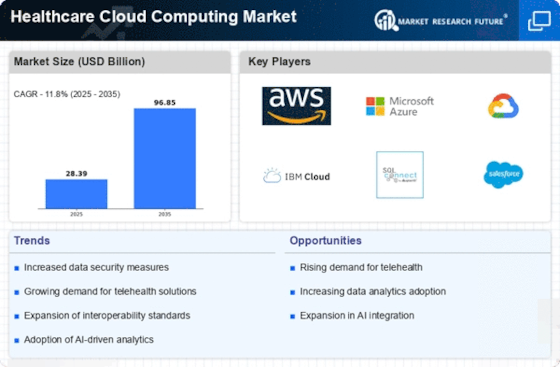Market Share
Healthcare Cloud Computing Market Share Analysis
Market share positioning in the Healthcare Cloud Computing industry starts with a deep understanding of the unique challenges and requirements of the healthcare sector. Providers customize their cloud solutions to address problems such as information safety, interoperability and rules. They adapt the product lines according to each healthcare organization’s unique requirements. The providers of cloud computing understand the variety health care sector, targeting specific sub components like hospitals, clinics research centers or to insurance companies. This focused approach enables them to adapt their solutions specifically for each sub-sector, thus making the resultant offers more pertinent. As healthcare information comes with so many sensitivities, successful market players have made effective security measures and compliance adherence a priority. Providers of Healthcare Cloud Computing spend much on encryption, access controls, and HIPAA compliance certifications to secure consumer trust that gives a firm market position. Providers set themselves apart thanks to continuity interoperability. Integrated cloud platforms that can work with existing healthcare infrastructure, EHRs and devices enjoy the competitive edge. This interoperability promotes data sharing and improves efficiency throughout the healthcare network. Realizing the divergence in healthcare workflows, cloud computing providers formulate solutions that are very adjustable. It is also important to tailor the features of a product by customizing patient data management, telemedicine support, and billing specifically for certain healthcare processes in order to ensure wide acceptance within this growing market. Healthcare cloud computing market leaders provide flexible solutions that adjust to the changing requirements of healthcare entities. Scalability allows the cloud infrastructure to accommodate high volumes of data and increased user demand, thus making it an economical and efficient approach for all organization types. By including capabilities such as advanced data analytics and insights, cloud computing providers improve their competitive edge. Predictive analytics, population health management and real-time reporting are some of the features that make health care organizations better decision makers while enhance value to cloud services. Considering the wide variety of IT environments in healthcare, providers provide both hybrid and multi-cloud solutions. This flexibility provides the ability for healthcare organizations to implement on-premise as well as cloud resources based upon regulatory and operational requirements. Remaining at the cutting edge of technology, healthcare cloud computing providers spend on new technologies such as AI and ML.
Because of understanding the relevance to user competence, successful cloud computing providers allocate funds for information about education and training programs. Trained professionals enhance their ability to efficiently operate the cloud-based solutions in such a way that customer satisfaction is achieved and retained. The pricing models used by providers are open and affordable pricing schemes which match the limitations of health care institutions in their financial position. Clear pricing structures, bundled services, and value-based models ensure that clients perceive the cloud solutions as valuable investments, positively impacting market share.


















Leave a Comment